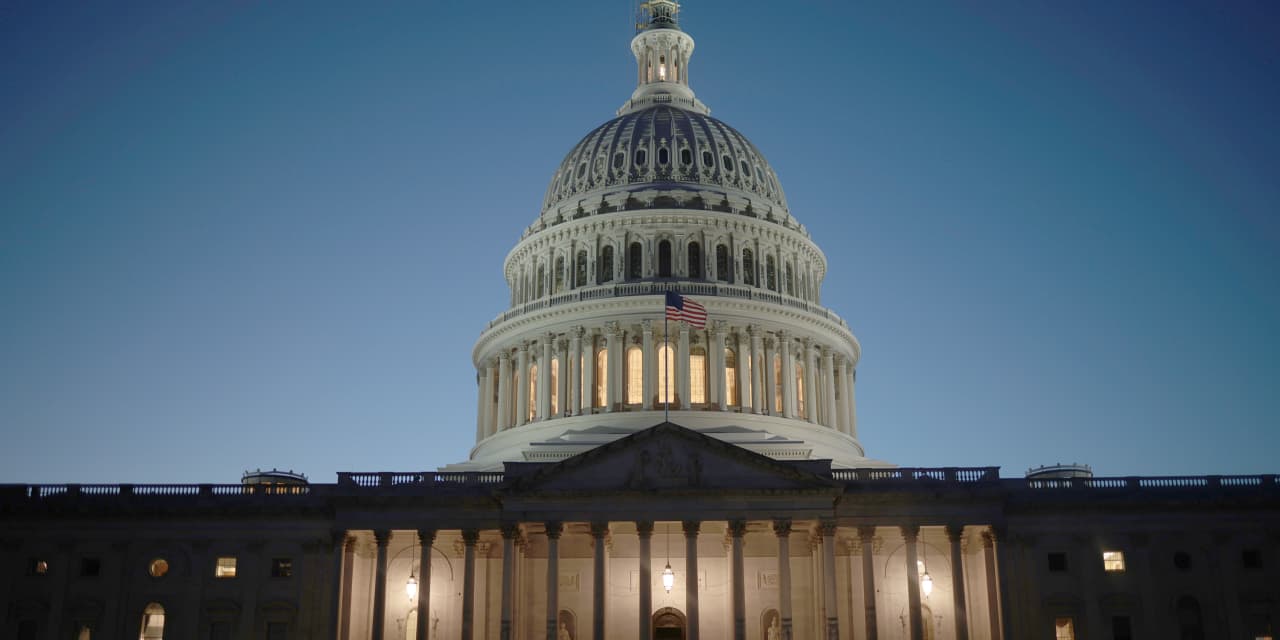Mike Johnson, the next speaker, will quickly turn to a bill to avoid a government shutdown.
Win McNamee/Getty Images
The House of Representatives on Wednesday elected Rep. Mike Johnson as Speaker of the House.
The vote ends a weeks-long intraparty fracas that saw the ascent and demise of a series of would-be speakers and finally allows Congress to turn back to legislating. But even with the battle over, Congress is running out of time this year to address critical needs, such as Israel aid and funding to avoid a government shutdown. Next year’s election makes legislative action less likely in 2024 as well.
In a vote Wednesday afternoon, the House elected Johnson (R., La.), with Republicans unanimously backing him over House Minority Leader Hakeem Jeffries (D., N.Y.). While he is already in the GOP leadership as vice-chair of the House Republican conference, Johnson is still one of the least-experienced members to ever take the gavel and could face a steep learning curve as he wrangles his party and fundraises for the 2024 election.
Johnson is now expected to turn almost immediately to a bill to avoid a government shutdown, currently slated for Nov. 17, as well as potential aid packages for Israel and Ukraine. Those three items in and of themselves could take up the bulk of the remainder of 2023.
“Any new speaker is likely to be a ‘SINO,’ speaker in name only, limited to a minimalist approach to governance, perhaps all the way through the 2024 elections,” wrote analysts for Beacon Policy Advisors in a research note on Wednesday before the vote.
A Johnson representative didn’t respond to a request for comment before the vote.
In a letter to lawmakers earlier this week, Johnson wrote that he would propose temporarily funding the government through Jan. 15 or April 15, depending on what reaches a consensus within the party, a stop-gap that would give the House more time to organize a more comprehensive spending bill.
Some policy analysts are already predicting that the House won’t be able to reach a deal before a shutdown sets in.
“We believe there will be a government shutdown in the fourth quarter of 2023, and recent events bolster that belief,” wrote BTIG analyst Isaac Boltansky in a note on Saturday, citing “political disdain” from the speaker fight.
Another side effect of the race to avoid a shutdown and pass aid packages is that sector-specific legislation that industry executives have hoped for is likely dead, at least for this year and perhaps through the 2024 election.
Marijuana companies, for example, had an outside hope for a bill that would provide a safe-harbor to give basic banking services to state-legal businesses hurt by the federal ban. The stocks of such companies rose during the year as the bill advanced—and after the Biden administration proposed easing marijuana’s classification among illegal drugs—but have faded in the past two months. The
AdvisorShares Pure US Cannabis
exchange-traded fund (ticker: MSOS) is now down about 5% for the year.
Even though the bipartisan bill faced a long road in the House, there was some hope among lobbyists that it could pass if included in a bill with other provisions that the House did favor. Crypto firms such as
Coinbase Global
(COIN), for example, this year have pushed legislation that would limit securities regulators’ purview over the industry, while giving trading platforms a clearer path to operate under the law. The House Financial Services Committee advanced such a bill this summer, but the Senate never embarked on a corresponding process.
While there might have been a slim chance that the crypto and cannabis provisions could move together attached to another bill as a sort of compromise, even those scant hopes are likely dead now.
One of the few sectors that might still see some help from the government this year is that of firms that operate detention centers, such as CoreCivic (CXW) and GEO Group (GEO), Boltansky wrote. That’s because the Biden administration as part of its Ukraine and Israel funding request also included about $14 billion for border security.
But those are outliers. Moving any legislation through Congress during a normal year is a long shot. During a year when the speaker’s main job is ensuring their party doesn’t fall apart, it is a bridge too far.
Write to Joe Light at [email protected]
Read the full article here










